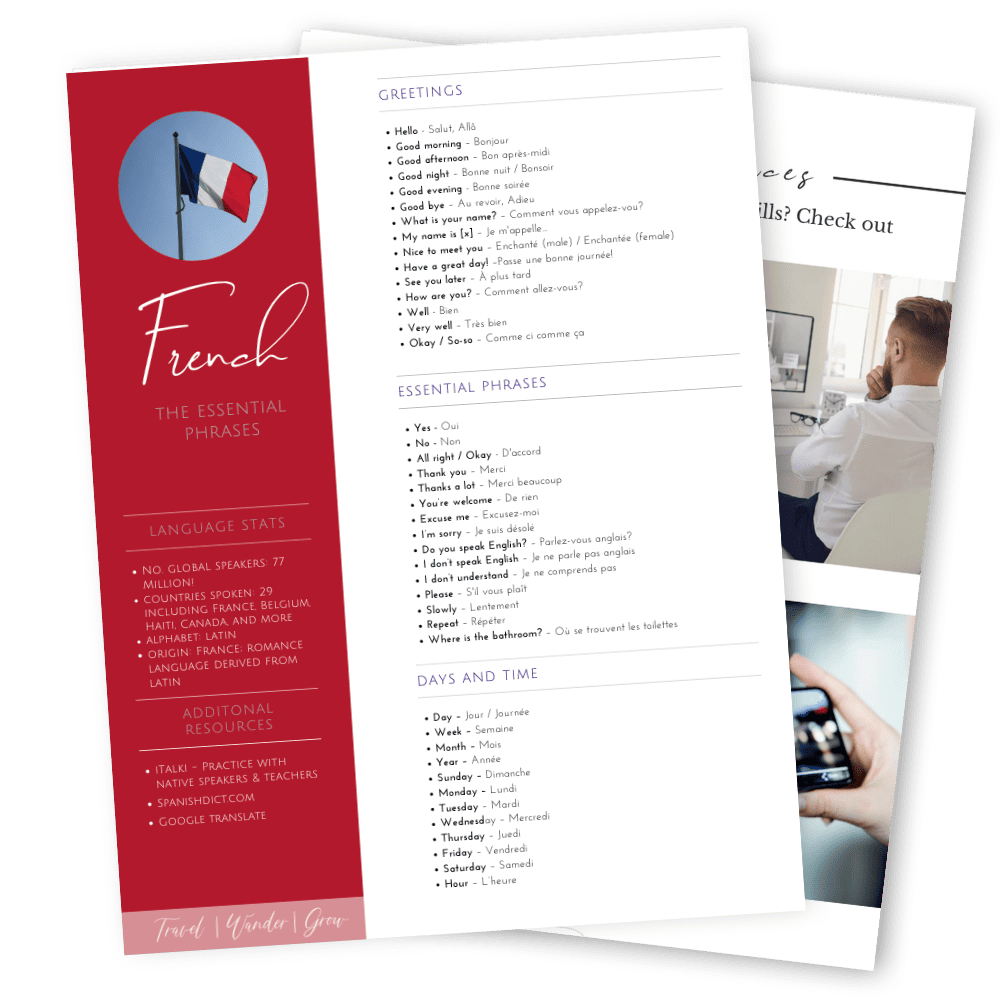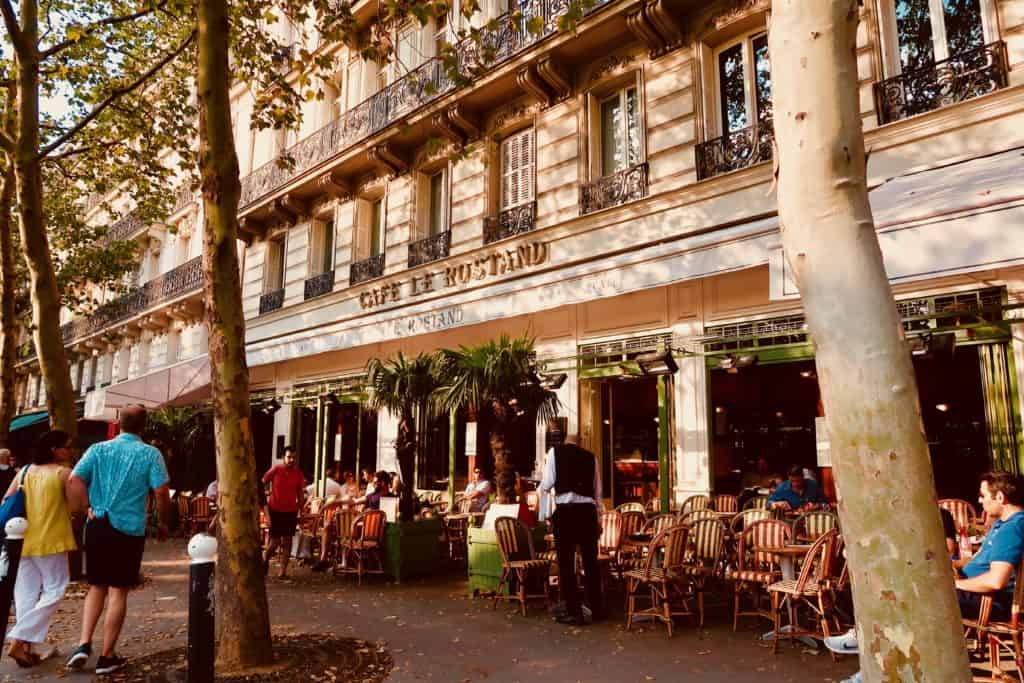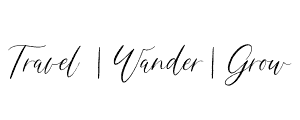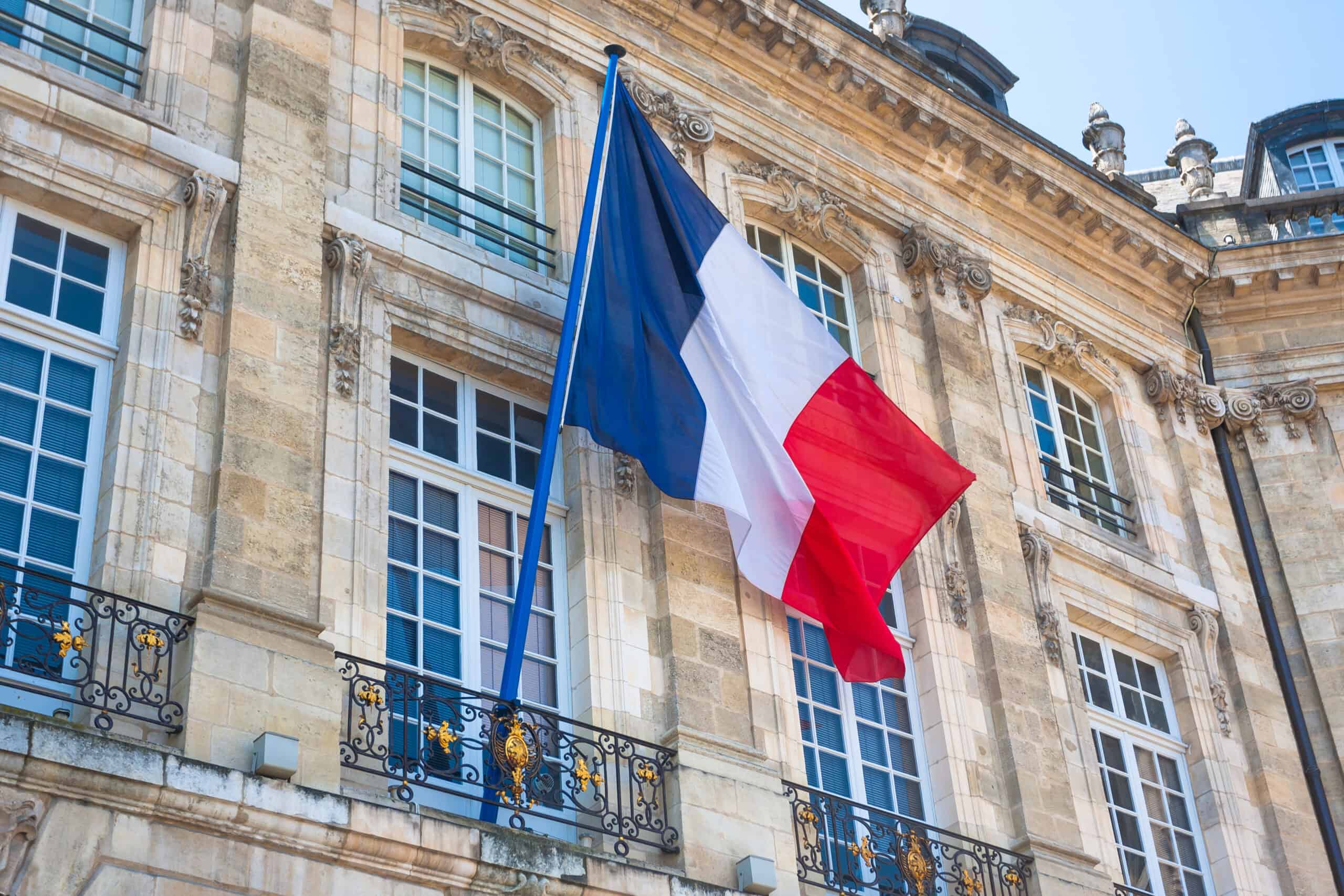The Best French Phrases PDF: Basics for Travel & More!

French is often known as the “language of love”. I has a unique melodic quality to it – especially to the untrained ear, making it an attractive language to learn. French is a global lingua franca today. It is the native tongue of approximately 77 million people, with an additional 204 million people speaking it as a second language across various parts of the world.
This eloquent and melodious language is an official language in 29 countries, which include France, Belgium, Canada, Rwanda, Cameroon, and Haiti. Besides these nations, it’s also widely spoken in various other regions of the world, such as parts of Africa, Europe, North and South America, and even some Pacific Islands. French, therefore, is an incredibly valuable language to learn for travel, business, and cultural exploration.
This post will provide both a comprehensive French Phrases PDF as well as tips and tricks for learning the basics of French.
The French Phrases PDF
This PDF of French Phrases is the ultimate guide for all the common phrases that you might use while traveling through a French-speaking country, like France.

get your free download!
French Phrases PDF
This free download includes all the key French phrases that you will need for your travels throughout France and any French-speaking country. In addition, get details on the best resources to improve your speaking and listening skills as well.
Overview of the French Language
History of the French Language
The history of the French language can be traced back to the Roman conquest of Gaul (modern-day France) in the first century B.C. Prior to the Roman invasion, the Gauls spoke Celtic languages; however, with the introduction of Latin by the Romans, these Celtic tongues gradually fell into disuse. Over several centuries, the Latin used by the common people, known as “Vulgar Latin,” evolved and regionalized, laying the groundwork for the various Romance languages, including French.
The French language underwent significant evolution during the Middle Ages, with the “Old French” period (9th to 14th century) witnessing a dramatic shift in vocabulary and grammar. This period also saw the introduction of the “liaison,” a characteristic feature of modern French pronunciation where a usually silent final consonant is pronounced at the beginning of the following word.
The standardization of French, as we know it today, began in the 16th century with the establishment of the Académie Française by Cardinal Richelieu, which continues to be the official regulatory body of the French language.

French vs. Other Romance Languages
While French shares its roots with other Romance languages—Italian, Spanish, Portuguese, Romanian, and others—it also exhibits distinct differences that set it apart. A significant distinction lies in pronunciation; the French language is known for its round, nasal sounds and the unique phonetic feature known as the “liaison”.
Moreover, French grammar is considered more complex compared to its counterparts, with a vast array of verb conjugations, a more frequent use of the subjunctive mood, and the existence of two genders (masculine and feminine) that affect the agreement of adjectives and articles.
Additionally, French vocabulary often differs from that of other Latin languages, attributed in part to the influence of the Gaulish and Frankish languages on Old French. Finally, the French language’s historical links with English have resulted in a significant sharing of lexicon that is not as prevalent in other Romance languages.
The Connection Between French and English
The intersection of French and English is a fascinating facet of linguistic history. After the Norman Conquest of England in 1066, French became the language of the English court, administration, and culture. This influence seeped into the English language, resulting in a significant influx of French vocabulary.
Over the centuries, an estimated one-third of the English lexicon has been borrowed from French, including words in art, literature, fashion, food, and law. Many English words have French roots, and the influence extends to idiomatic expressions as well. This intertwining of languages has not only enriched the vocabulary but also accentuated the complexity and diversity of English.
As you review the vocabulary covered in this post, you may notice there are some words that are spelled exactly the same as they are in French. Note, due to the aforementioned evolution of the French language in the Middle Ages, the pronunciation today differs greatly. But this is a feature that does make reading French easier for English speakers.
French Phrases for Travel Cheatsheet
There are several French words that you should learn if you are visiting a French-speaking country. The common French phrases found in the list below include those that you might use in everyday conversations (or small talk) as you navigate the country that you are visiting.
French Greetings
Below are basic French phrases you might use to greet or say goodbye to locals. Note, unless noted, these focus more on formal language, as it is most common that you will be speaking to people that you do not already know.
- Hello – Salut, Allô
- Goodbye – Au revoir, Adieu
- How are you? – Comment allez-vous? (formal) / Comment vas-tu? (informal)
- How are you doing? – Ça va?
- What’s new? – Quoi de neuf (informal)
- Good morning / Good day – Bonjour (also used to simply say hello)
- Good afternoon – Bon après-midi
- Good night – Bonne nuit / Bonsoir
- Good evening – Bonne soirée
- What is your name? – Comment vous appelez-vou?
- My name is…– Je m’appelle…
- Nice to meet you – Enchanté (male) / Enchantée (female)
- Have a great day! – Passe une bonne journée!
- See you later – À plus tard
- Well – Bien
- Very well – Très bien
- I’m fine – Pas mal (literally “not bad”)
- Okay / So-so – Comme ci comme ça
- And you? – Et toi?
- I’m from… – Je suis de…
- Where are you from? – D’où êtes-vous?
Essential French Phrases
Essential phrases are those you’d use most frequently, outside of greetings of course.
- Yes – Oui
- No – Non
- All right / okay – D’accord
- Thank you – Merci
- Thanks a lot – Merci beaucoup
- You’re welcome – De rien
- Excuse me – Excusez-moi
- I’m sorry – Je suis désolé
- Do you speak English? – Parlez-vous anglais?
- I don’t speak English – Je ne parle pas anglais
- I don’t understand – Je ne comprends pas
- Please – S’il vous plaît
- Slowly – Lentement
- Repeat – Répéter
- Where is the bathroom? – Où se trouvent les toilettes

Days, Months, and Time in French
The days of the week and all other phrases related to telling time.
DAYS/WEEK IN FRENCH
- Day – Jour / Journée
- Week – Semaine
- Sunday – Dimanche
- Monday – Lundi
- Tuesday – Mardi
- Wednesday – Mercredi
- Thursday – Jeudi
- Friday – Vendredi
- Saturday – Samedi
MONTHS/YEAR IN FRENCH
- Month – Mois
- Year – Année
- January – Janvier
- February – Février
- March – Mars
- April – Avril
- May – Mai
- June – Juin
- July – Juillet
- August – Août
- September – Septembre
- October – Octobre
- November – Novembre
- December – Décembre
TELLING TIME IN FRENCH
- Minute – Minute
- Hour – L’heure
- Time – Le temps
- What time is it? – C’est à quelle heure?
- At what time? – À quelle heure…?
- It is 1:00AM – Il est une heure
- It is 2:00 / 3:00PM – Il est quatorze / quinze heures
- What day is today? – Quel jour sommes-nous?
- Tomorrow – Demain
- Yesterday – Hier
- Morning – Matin
- Midday – Midi
- Midnight – Minuit
- Night – Nuit
- (Three weeks) ago – Il y a (trois semaines)
- Today – Aujourd’hui
- Now – Maintenant
Numbers
| One – Un | Sixteen – Seize |
| Two – Deux | Seventeen – Dix-sept |
| Three – Trois | Eighteen – Dix-huit |
| Four – Quatre | Nineteen – Dix – neuf |
| Five – Cinq | Twenty – Vingt |
| Six – Six | Twenty-one – Vingt-et-un |
| Seven – Sept | Thirty – Trente |
| Eight – Huit | Forty – Quarante |
| Nine – Neuf | Fifty – Cinqunte |
| Ten – Dix | Sixty – Soixante |
| Eleven – Onze | Seventy – Soixante-dix |
| Twelve – Douze | Eighty – Quartre – Vingt |
| Thirteen – Treize | Ninety – Quartre – Vingt – Dix |
| Fourteen – Quatorze | One Hundred – Cent |
| Fifteen – Quinze | One Hundred and One – Cent un |
Directions
Phrases and words for getting around town.
- Where is…? – Où est…?
- The bus stop – L’arrêt de bus
- The bank – La Banque
- The museum – Le musée
- The park – Le parc
- The hospital – L’hôpital
- The airport – L’aéorport
- The church – L’église
- How do you get to…? – Comment vas-tu au…?
- Left – Gauche
- Right – Droite
- Straight – Droit
- Turn to the... – Tourne à…
- How far away is…? – À quelle distance est…?
- It is two blocks away – C’est à deux pâtés de maisons
- It is five minutes away – C’est à cinq minutes
- What is the address? – Quelle est l’adresse?
Transportation
Phrases and words for traveling to further destinations.
- By bus – En bus
- By train – En train
- By car – En voiture
- By plane – En avion
- By subway / metro – En metro
- Where is the train station? – Où est la gare?
- Where is the bus stop? – Où est l’arrêt de bus?
Eating Out
Phrases and words to use when ordering food at a restaurant.
- Restaurant – Restaurant
- Breakfast – Petit-déjeuner
- Lunch – Déjeuner
- Dinner – Dîner / Souper
- Appetizer – Hors-d’œuvre / apéritif
- Main Course – Plat principal
- Dessert – Dessert
- What do you recommend? – Que recommandez-vous?
- I would like (to order) – Je voudrais commander…
- The bill please – L’addition s’il vous plait
- I’m vegetarian – Je suis végétarien
- I’m allergic – Je suis allergique
- Red wine – Vin rouge
- White wine – Vin blanc
Shopping
Phrases and words to use when going shopping.
- How much does it cost? – Quel est le prix?
- Store – Le magasin
- Price – Le prix
- Money – L’argent
- Credit card – Carte de Crédit
- Do you accept credit cards? – Acceptez-vous les cartes de crédit?
- Cash – Espèces
- Discount – Rabais
- Shirt – La chemise
- Blouse – La blouse
- Pants – Le pantalon
- Shoes – Les chaussures
- Suit – Le costume
- Swimsuit – Le maillot de bain
French Pronunciation Tips
In my humble in opinion, when learning French, I’ve found mastering French pronunciation the most challenging aspect. It is certainly much more difficult than Spanish and even Portuguese in that aspect. However, there are a few key tips that you can follow to sound more like a native speaker.
The French ‘R’
The first tip is about the French ‘R’ sound. Unlike the English ‘R’, the French ‘R’ is pronounced at the back of the throat, almost like a soft gargling sound. It can take some practice to get this right, but once you do, it will significantly improve your accent.
French Vowels
Another important aspect is the pronunciation of French vowels. French vowels often don’t sound the way they would in English. For example, the French ‘e’ can be pronounced in several ways, such as ‘eh’, ‘ee’, or ‘uh’, depending on the word and the accents used.
Liaison Words
Secondly, the concept of liaison in French pronunciation is essential to understand. As mentioned earlier, liaison is a unique feature of French where a usually silent final consonant is pronounced at the beginning of a following word that starts with a vowel or silent ‘h’. However, not all words follow this rule, and there are instances where liaison is obligatory, optional, or forbidden. Therefore, it’s beneficial to familiarize yourself with these rules to improve your fluency and pronunciation.
Final ‘S’ in French
Moving on to another common misstep: the pronunciation of the final ‘s’ in French words. It’s crucial to remember that, unlike in English, the final ‘s’ in French is typically silent. This rule has some exceptions, particularly when the following word begins with a vowel or a silent ‘h’, a phenomenon known as ‘liaison’, as previously mentioned.
An example is the French word ‘les’, which is often pronounced without the ‘s’ sound, unless it’s followed by a word that starts with a vowel. So ‘les chiens’ (the dogs) would have a silent ‘s’, but in ‘les oiseaux’ (the birds), the ‘s’ would be pronounced.
Remember, pronunciation rules in French can seem confusing at first, but with focused practice and exposure to native French speech, these sounds will become second nature. Always keep this rule in mind when speaking, and your French pronunciation will greatly improve.

Resources to Learn French
If you would like to practice French before your travels, here are a few resources that I recommend you consider:
iTalki
As I mentioned in my post on Spanish phrases, practicing is really key to feeling comfortable using a new language. You can practice with native speakers by using my favorite language resource, iTalki. On this site you can practice with a tutor, formal teacher, or others just seeking to do a language exchange (for free!).
One really cool thing is that you can elect the native French speaker form the country of your choice. The paid lessons have very cheap options, with some as low as $5 an hour. Check it out!
YouTube
I love using this platform to learn almost everything. Relevant to learning French, YouTube is great for finding videos that allow you to hear the accurate pronunciation of words. As mentioned earlier, pronouncing French can be a bit tricky for English speakers, and listening is a great way to open your ears to better understanding of the language. See the video linked below as an example. Here is a video that you can go ahead and check out now below:
Textbook-Based Learning:
There are plenty of textbook resources that you can purchase on sights like Amazon to get more structured practice. If you go this route, one proven method for learning a language more quickly is through short stories. Check out the Short Stories in French book to see how helpful it can be for you.
In Summary | The Ultimate French Phrases PDF
I hope that you’ve found the French Phrases PDF and this list of basic French phrases incredibly helpful. I’ve used this list to help me when navigating travel to Paris, and I hope that you will too! Remember, as with all language learning, spending time practicing is key! As a final tip, you may want to make virtual flash cards with the words found here to make practicing even easier.

get your free download!
French Phrases PDF
This free download includes all the key French phrases that you will need for your travels throughout France and any French-speaking country. In addition, get details on the best resources to improve your speaking and listening skills as well.
Related Posts on France:
Related Language Learning Guides:
- Italian for Travel
- Portuguese for Travel
- Spanish for Travel
- Japanese for Travel
- Thai for Travel
- Greek for Travel
Don’t forget to pin this for later!


